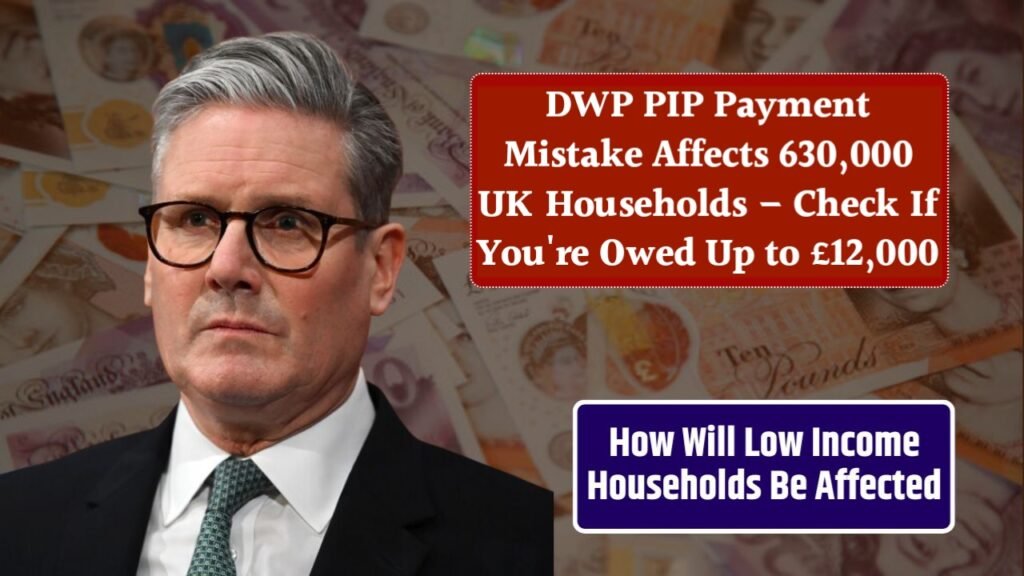A major error by the Department for Work and Pensions (DWP) has left hundreds of thousands of people across the UK out of pocket. Over 630,000 households who receive Personal Independence Payment (PIP) may have been underpaid, and some could be owed as much as £12,000. If you or someone in your household has claimed PIP in the past, it’s crucial you understand how this mistake may affect you, and how you can claim what you’re owed.
What Is The DWP PIP Payment Mistake?
The issue stems from a reassessment of how certain PIP claims were processed, particularly those involving mental health conditions. Between 2011 and 2021, DWP admits it did not fully consider all aspects of people’s conditions when calculating entitlement, particularly how mental health affected their mobility and daily living needs. As a result, many claimants received lower awards than they were eligible for – and in some cases, nothing at all.
How Many People Are Affected?
According to recent reports, around 630,000 people across the UK have been affected by this error. Some of these people are still receiving PIP, while others may have had their claims rejected unfairly. The DWP has already reviewed hundreds of thousands of cases, but many more are still pending, meaning you could still be due a correction and a backdated payment.
How Much Money Could You Be Owed?
In some cases, individuals could be owed a lump sum of up to £12,000, especially if their underpayments date back several years. While not everyone will receive such a large amount, even a few thousand pounds could make a huge difference to many households struggling with the cost of living. The average back payment varies, but DWP says some payments will include interest, especially if delays have been extensive.
Who Might Be Eligible For A Back Payment?
You might be eligible for a backdated payment if:
- You received PIP between April 2011 and 2021.
- Your condition involved mental health issues, such as depression, anxiety, or PTSD.
- You were denied the enhanced mobility or daily living component unfairly.
- You believe your condition wasn’t fully considered when your claim was assessed.
Even if you’re no longer receiving PIP, or your claim was previously rejected, you could still be entitled to compensation if your case was mishandled.
How Will You Know If You’re Affected?
The DWP has said it is contacting affected individuals automatically, so in most cases, you won’t need to apply. However, the process is taking time, and some people might not hear anything for several months. If you believe you might be affected and haven’t been contacted yet, you can get in touch with the PIP enquiry line or speak to a welfare rights adviser who can help investigate your case.
How Is DWP Correcting The Mistake?
The DWP has committed to reviewing all affected cases and making back payments where underpayments have occurred. So far, thousands of reviews have been completed and payments have already started. However, the department says the process will continue into 2025, so patience is key if you’re still waiting.
In addition to payments, DWP is working on improving its assessment process to make sure similar mistakes don’t happen again. Campaigners have welcomed the back payments but are urging the government to speed up reviews and provide better support to those affected.
What Should You Do Now?
If you think you might be affected by the PIP underpayment issue, here’s what you can do:
- Wait to be contacted: DWP will write to you if your case is being reviewed.
- Keep records handy: Letters, assessments, and past payment history may help your case.
- Contact DWP or a support service: If you believe you’ve been missed or wrongly assessed.
- Don’t ignore letters from DWP: Respond promptly if you receive any communication about PIP.
If you’re not confident dealing with DWP directly, many local charities and organisations like Citizens Advice or Scope can help guide you.
Will This Affect Your Current Benefits?
If you are currently receiving PIP and are granted a back payment, your ongoing entitlement may increase. This could also affect other benefits that depend on your PIP rate, such as:
- Carer’s Allowance
- Universal Credit
- Housing Benefit
- Council Tax Support
In most cases, receiving a back payment won’t affect your eligibility for other benefits, but any changes to your regular award might lead to reassessments.
Why Did It Take So Long To Discover?
The issue dates back over a decade and came to light through legal challenges and benefit appeals brought by claimants and advocacy groups. It has taken years of pressure for DWP to admit the scale of the error and begin repaying what’s owed. Critics have called for greater transparency and faster action to support vulnerable people affected by government mismanagement.
What If You’re Still Waiting For A Decision?
If you’re waiting on DWP to review your case, you are not alone. Many claimants have shared their frustrations on social media about long delays and lack of communication. While it may take time, staying informed and following up if needed will ensure you don’t miss out.
Some people have found it helpful to contact their MP, especially if their situation is urgent or has dragged on too long. MPs can often raise your case with DWP on your behalf and speed things up.
Conclusion
The PIP underpayment scandal is a stark reminder of how crucial accurate and fair benefit assessments are for vulnerable people. With over 630,000 UK households affected, this mistake has already had a widespread impact – but it also offers a chance for those wronged to receive long overdue payments.
If you think you might be owed money, don’t wait in silence. Check your records, contact the DWP if needed, and seek help if you’re unsure. You could be owed thousands – and in the middle of a cost-of-living crisis, that could make all the difference.
